| The girl likes
sports, but her school has no sports program for girls. In
seventh grade, she heads a petition drive, requesting the school
board to start girls basketball. This petition drive is
conducted decades before photocopy machines, computerized word
processors and laser printers.
As a child and young adult, the girl often thinks of herself
as a troublemaker. She does not realize that her family and
school do not have adequate outlets for her energy . . . nor has
it dawned on her that the circumstances at home and in her rural
community contribute to her restlessness. Nor does she value her
perceptions. Perceptions that see injustice.
|
 |
|
At the beginning of each school year, the grade school teachers
ask the boys to go to the first floor supply room to bring back
the stacks of textbooks that will be distributed to the students
for the year. The girls are to remain seated at
their desks. In sixth grade, for physical education, the head
high school basketball coach comes to the classroom early and
gets the boys. The guys go to the locker room, change into their
white gym shorts and T-shirts and put on their Converse tennis
shoes, then have a full-scale class in the new gym on the basics
of basketball. Near the end of the P.E. hour, the sixth-grade
teacher takes the girls to the gym, lines them up in single
file, in their school clothes (skirts and dresses) to shoot free
throws at one of the side baskets. |
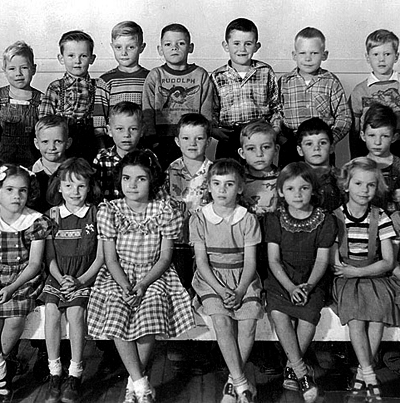 |
What miffs the girl even more is that part of her hour of P.E.
has been robbed. It is a disgrace, like being in prison,
to sit in that sixth-grade classroom on the second floor near
the superintendent's office two-thirds of the P.E. hour while
the boys get their workout with the head coach. But to add
insult to injury, the teacher requires the girls to count two
points for each free throw they make. And the teacher does not
acknowledge the girl is right when she says a free throw counts
for only one point. |
| The girl and two seventh-grade classmates write the petition on
school-lined paper out of a spiral notebook and approach the
other seventh-grade girls in the hallway during the noon hour.
They get eleven signatures which means that over half the girls
in the class support their efforts. The list is written in
pencil along the left margin of the page under the simple
sentence across the top. It is in the best of junior high
language and contains no phrases of "whereas and thereby." It is
less complex, but only by a degree, than the statement that the
nation and state refuse to endorse in her adult years that would
have ensured that opportunity under the law would not be denied
due to one's gender. |
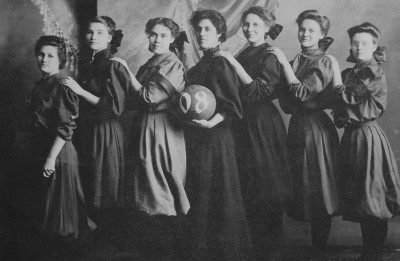 |
These girls have not heard the term
"suffragette" nor do they know their school had sported a girls
basketball team in the early part of the century. The
obstreperous one has never seen the photograph of her great-aunt
and teammates, lined up in their bloomers and sailor shirts,
holding the basketball, painted with white letters that say "RHS
1908."
|
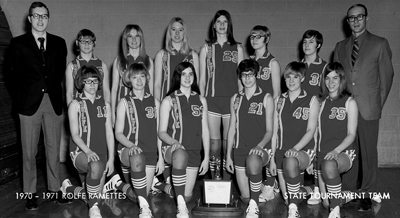 |
Nor can she predict, that her youngest sister,
ten years behind her, will be a starting guard and go to the
state tournament with the school's basketball team while she is
in the early part of her career teaching physical education in
Duluth, Minnesota. |
|
These seventh-grade girls, in a town of 800, in northwest
Iowa, who seek a single page full of signatures over the noon
hour, know they are getting the short end of the stick. They
make their petition specific. They address the letter to the
school board and begin with the salutation, "Dear Sirs." Their
statement follows, written in a mere sixteen words. "We, the
undersigned, request that Rolfe Consolidated Schools begin to
have an interscholastic girls basketball program."
The eighth-grade boys lure the group into letting them help
with the petition. The girls do not trust the boys, but the boys
assure them of their good intentions. However, when the girls
hand their sheet of paper to the boys, the boys tear it up.
|
| The girls start another petition and mail it to the board.
Mr. Ralph Mortensen, the superintendent at the schools
throughout the 1950's, the years that the obstreperous one is in
kindergarten through junior high, calls her into his office to
relay a message from the board that it has gotten the petition.
He says, "Now this doesn't mean that the board says you can have
basketball or not. It just means that they want you to know they
got your petition. However, it may be that as you get older, you
will realize that there are good reasons why girls shouldn't
play sports." The girl says nothing. Fortunately, two years
later, her school consolidates with the Des Moines Township High
School that already has a girls basketball team. |
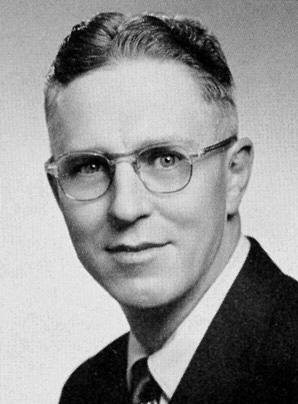 |
 |
Mr. Mortensen moves to another school. The
girl is in ninth grade and gets her opportunity to play
basketball. There is uncertainty. The players from the
township school have competed before, but the others do
not have an inkling of what to expect either in practice
or at an actual game. There is a full range of girls,
freshmen to seniors, who have long been denied the right
to play but now are anxious to have their day on the
court; however, they go through the early weeks of
practice, not knowing who will make the cut and get to
take home uniforms. There is also smugness. She does
exactly as she is told and catches onto drills easily
and is able to run the plays smoothly. She is a bit
cocky, anticipating how well these plays will work
against other teams. |
|
|
The day comes for the coach to hand out the uniforms. He
stands in the center of the gym while the girls sit along the
end line. He reads the names of the players one at a time. Those
who make the cut join him in the center circle. Those who don't
get to go home. The night of the opening game comes. It's a road
trip. The girl gets to play most of the junior varsity game. Not
only does her team lose but she feels lost in the locker room
after the game. She is surprised
when the coach comes to her and says she should prepare to join
the varsity squad for its game. Even though she sits on the
bench, the idea of making the varsity gives her a spark of joy
in an otherwise desolate evening.Beginning her sophomore year, she gets to be a starter on the
varsity squad because one of the leading scorers who had come in
with the township team had gotten pregnant and had to leave
school. However, in all her high school years, the girl's team
wins only a handful of games, playing against successful teams
in the conference who had decades of basketball history behind
them.
There is one game, a road trip to Twin Rivers, that is
devastating, not because it is that much worse than other games,
but because the pressure of losing so many times has accumulated
to a breaking point. No matter how well practice has gone or how
much her team has improved, it cannot penetrate the opposing
defense. The Twin Rivers guards anticipate every move and are
not fooled by a head or body fake. They prevent the forwards
from entering the free throw lane and getting close to the
basket. They block shots and intercept passes. In essence, they
shut down whatever offense that the girl and her team mates have
developed. After the game, the girl goes by herself to a side
section of the locker room. She is in no hurry to get dressed
and does something she has never done before. She sits on the
floor in the middle of a pile of towels, duffle bags, street
shoes and clothes, her legs folded with her knees tucked against
her chin so she can fit between the row of metal lockers and the
dressing room bench. It is an awkward place to be but the only
place to withdraw. She begins to cry then bawls. Her face is
red. Tears stream down her cheeks. Eventually she picks herself
up, showers, dresses and heads for the bus with the rest of the
team. Nothing is said. Several days later at home, after the
girl cleans her room and does her other required Saturday
household chores, she scampers downstairs to the living room to
check in with her mother before heading out doors. Her mother
stops her and wants to talk. She says she has heard that the
girl cried after the game at Twin Rivers. The girl wonders how
her mother knows what happened but says nothing. Her mother
continues, "We don't cry about things like losing a ball game."
The girl remains attentive, albeit quiet, a proper amount of
time for the conversation to conclude without being abrupt or
rude, then continues on her way to be out and about the farm
with her horse.
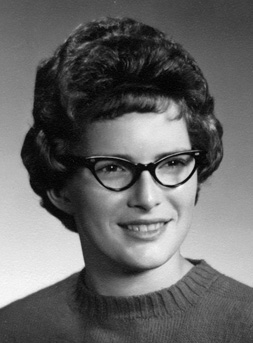 |
As a high school senior, she realizes she has only
one year remaining to make good at basketball. One night
late in the fall, after the basketball season begins,
she goes out by the garage where there is a post and
basketball basket at each end of a rectangular, concrete
parking area. It is the family basketball court. In the
cool, harvest air, that has a hint of winter, she
practices long and hard. She does lay-ups, making a loop
from the basket at one end to the basket at the other.
She is concerned about how little spring there is in her
jump. Each time around, she tries to leap higher but
cannot go higher. The rest of the family has gone to
bed, but she stays out under the yard light. |
|
|
One more lay-up along the baseline, she says to herself, and
she will go in. She goes for the lay-up, but comes
down hard, turning her ankle on the edge of the concrete where
it drops off and becomes grass. She is in great pain, swears at
herself, then manages to hobble into the house and up the stairs
to her bedroom. The next morning, her ankle is swollen and
purple. She cannot stand on her foot or get ready for school.
She has to tell her mother. A trip to the doctor. X-rays, an ace
bandage and crutches, Epsom salts and hot water. The ankle
begins to heal. The coach wraps it with many layers of adhesive
tape. The girl plays but sprains her ankle two more times during
the season, once at practice and another during competition. The
game at Pocahontas is going well, but she trips over her own
feet, turns the ankle, and crashes to the floor. She slams her
sweaty palm on the varnished wood in anger and frustration. She
gets to her feet, is helped to the bench, puts ice on the ankle,
and sits out the rest of the game. She is put on crutches again
and misses more games. As she sits as a civilian in the
bleachers and watches her teammates in action, she isn't sure
she wants to play any more. The season is sliding by with little
prospect of winning, so what is the use. Her basketball career
is nearly over with no sign of success.
The girl returns to competition, and her team wins three
games before the season is over, but she realizes it is hard to
make the short jump shot. It's especially frustrating when she
is in the open under the basket. She runs the play perfectly,
faking out her guard, rolling off the screen, moving to the left
of the lane, getting the long pass from center court, but
clutches. She sees the rim. A big circle. An easy shot. But in
that split second before she releases the ball, she thinks,
"I'll probably miss." And she does.
At fifty, she goes to her school's all-class reunion where
multiple generations of her hometown clan gather. The only
speaker is Mr. Mortensen. She wants to stand up, like at a press
conference, and demand that he respond to her question. To
insist that he explain what he meant by those remarks he made in
1957. To demand an apology. But of course she doesn't. What
would her classmates think? What would her parents think? What
would she think of herself?
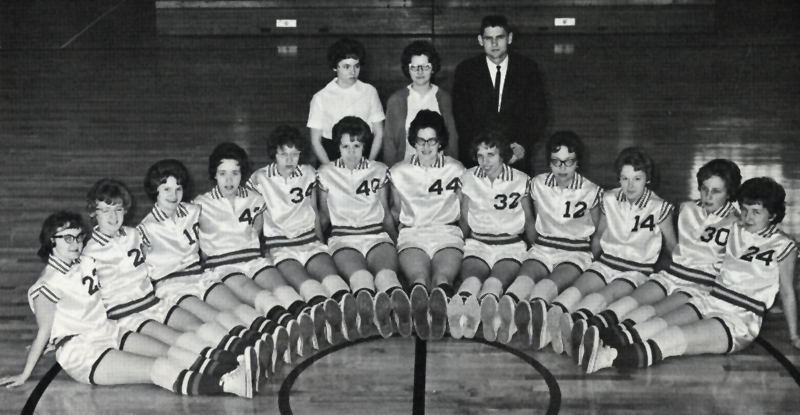
Rolfe High School 1963 girls
basketball team. Front row, left to right: Linda Leadley,
Diane Callon, Joann Bennett, Phyllis Pedersen, Debra Johnson,
Kaye Smith, Helen Gunderson, Shirley Bennett, Carol Biedermann,
Chris Trimble, Geraldine Baker, Diane Trimble. Back row:
managers Ann Cleal and Sharalyn Wolf, coach Jack Head. |
|